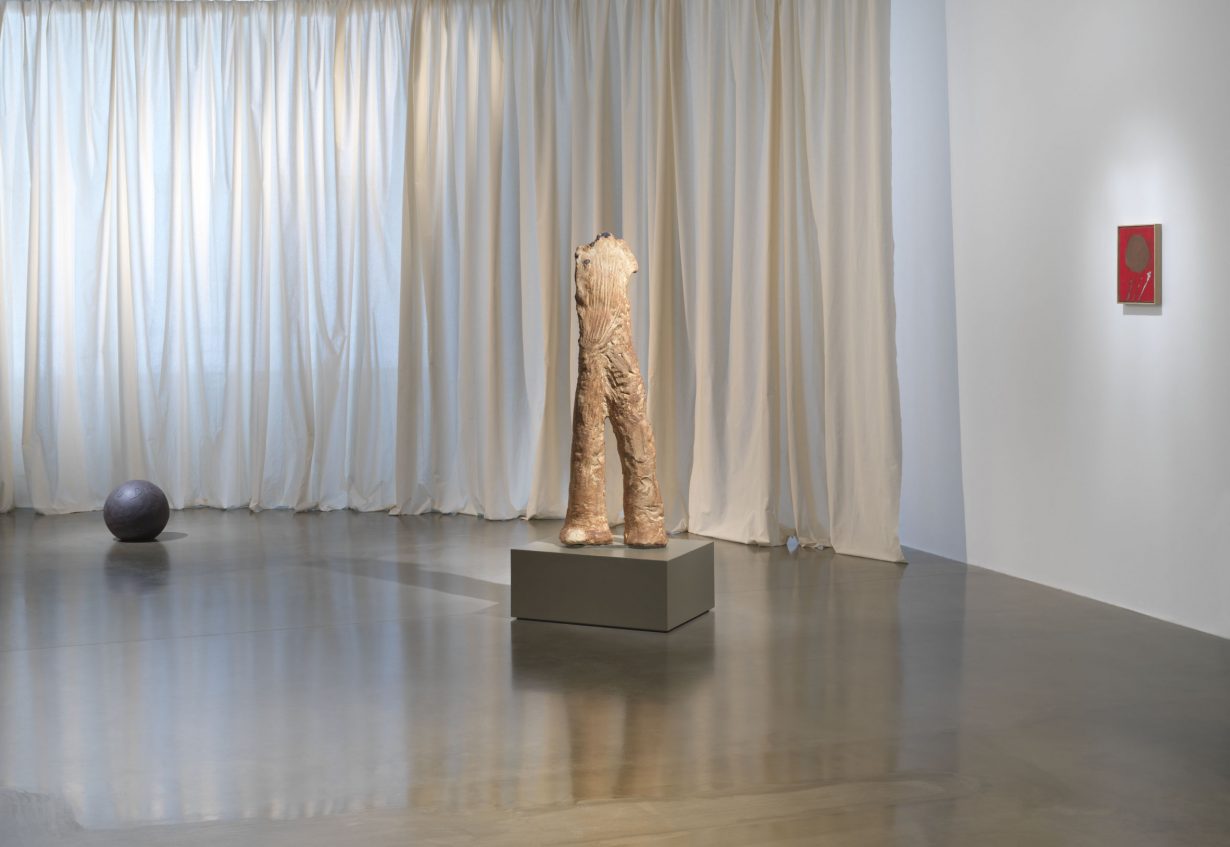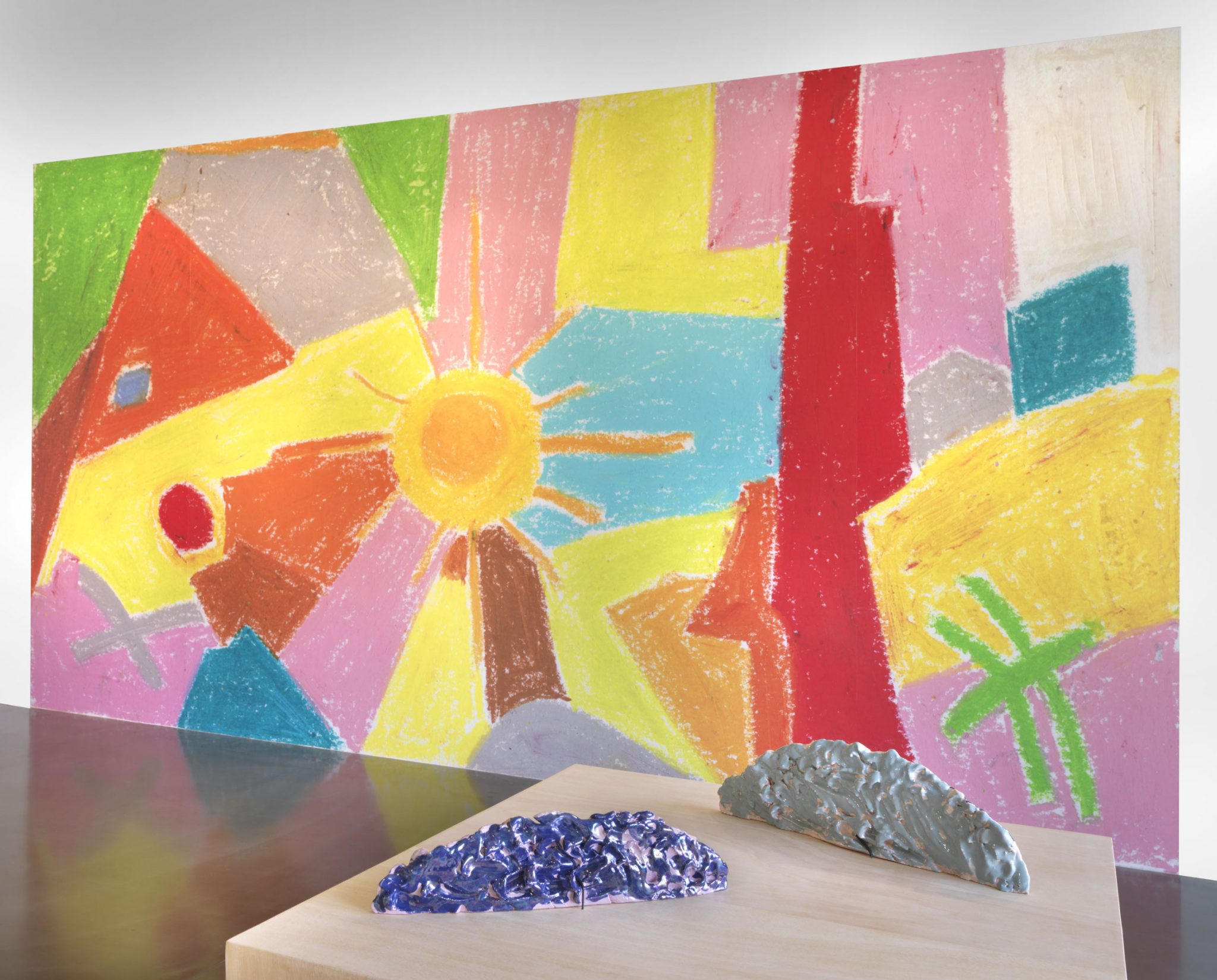Voices without borders at KINDL, Berlin explores the role of the witness via ephemeral and material entities
In Voices without borders, Etel Adnan and Simone Fattal’s personal, creative and political connections play out in textiles, paintings, etchings, sculptures and writing – what the artists might call intersecting ‘orbits’. (Life partners, they shared a love of interstellar travel and the American space programme, and Adnan saw astronauts as martyrs.) Most intriguing, this show suggests, is their mutual exploration of the role of the witness via ephemeral and material entities: as colour, text and form, as the sun.
Adnan, who died in 2021, was a formalist; a lover of colour, of shape and its relationship to space. Two small oil paintings, Satellites 18 and 22 (both 2020), and the larger Composition dans l’espace (1960s/2003), clarify the Lebanese-American artist and writer’s aesthetic upfront. Brightly coloured geometric shapes hover, intersect and nest within each other, referencing modernist abstract paintings and childlike drawings of suns in skies; they’re joyful in their apparent straightforwardness, spirited in their gravitation towards the cosmos. Across the room, under glass, five minimal but equally energetic etchings (all 2020) by the Syrian-born Fattal indicate her own take on space and form. These works assume a bird’s-eye view referencing earth rather than sky, looking down. At first, Fattal’s gestures read as evidence or strange lingual marks to be followed like prints in sand. Closer, they become soldiers, buildings, bodies, bodies of water, forests, the titles suggesting an Arab cavalry, a mountain, a river in Damascus and a pre-Islamic Arab clan.

Echoing Fattal’s scratchy etched lines, Adnan’s poem ‘The Arab Apocalypse’ (published in 1980 in response to the Lebanese Civil War) awaits viewers in a dimmed anteroom. In handwriting transposed to the wall, an excerpt exposes the work as a formal hybrid: of poetry, visual art and translation. A yellow sun / A green sun / a yellow sun / A red sun / a blue sun…, Adnan writes. Through constant described changes in colour and form, she decentres the reader amidst the volatile cycles of violence and time. A sun lying on the highway a sheriff checking its heart. Have a good laugh. ???, reads another line; nearby, Adnan writes, and circles for emphasis, ‘torching’. Here, just as Fattal’s earth-toned etchings change with observation, Adnan’s sun – usually taken for granted as stable – transforms from witness to subject and back again. Scribbled over and crossed out, Adnan’s poem is constructed and deconstructed just as Beirut has fallen and risen, prey to the unpredictable machinations of war. As Aditi Machado wrote in poetry website Jacket2, ‘the text becomes a disaster in the process of witnessing [a] disaster’.
How language intersects with the visual in the show (eg a list of publications by Fattal’s experimental publishing house, The Post-Apollo Press; Adnan’s self-made alphabet framed as a sketch) reinforces the work of each artist as forms of intimate documentation. This feeling stands in sharp contrast to the overly clean, commercial-style installation of the exhibition space.
In Deena Charara’s video interview here, Adnan says, “A martyr’s primary sense is to witness”. Both she and Fattal, by focusing on the act of distancing via perspective and astronomical space, sacrifice the self for the sake of the voyage (the art). The artists, positioning themselves as witnesses to their Lebanese and Syrian roots, to war, to colonisation, to displacement, provocatively challenge the very idea of stability. Rather than solidify narrative via documentation or memory, Adnan and Fattal make and eradicate form, obscure and reveal identities, gestures and histories.
Voices without borders at KINDL, Berlin, through 1 January 2024
